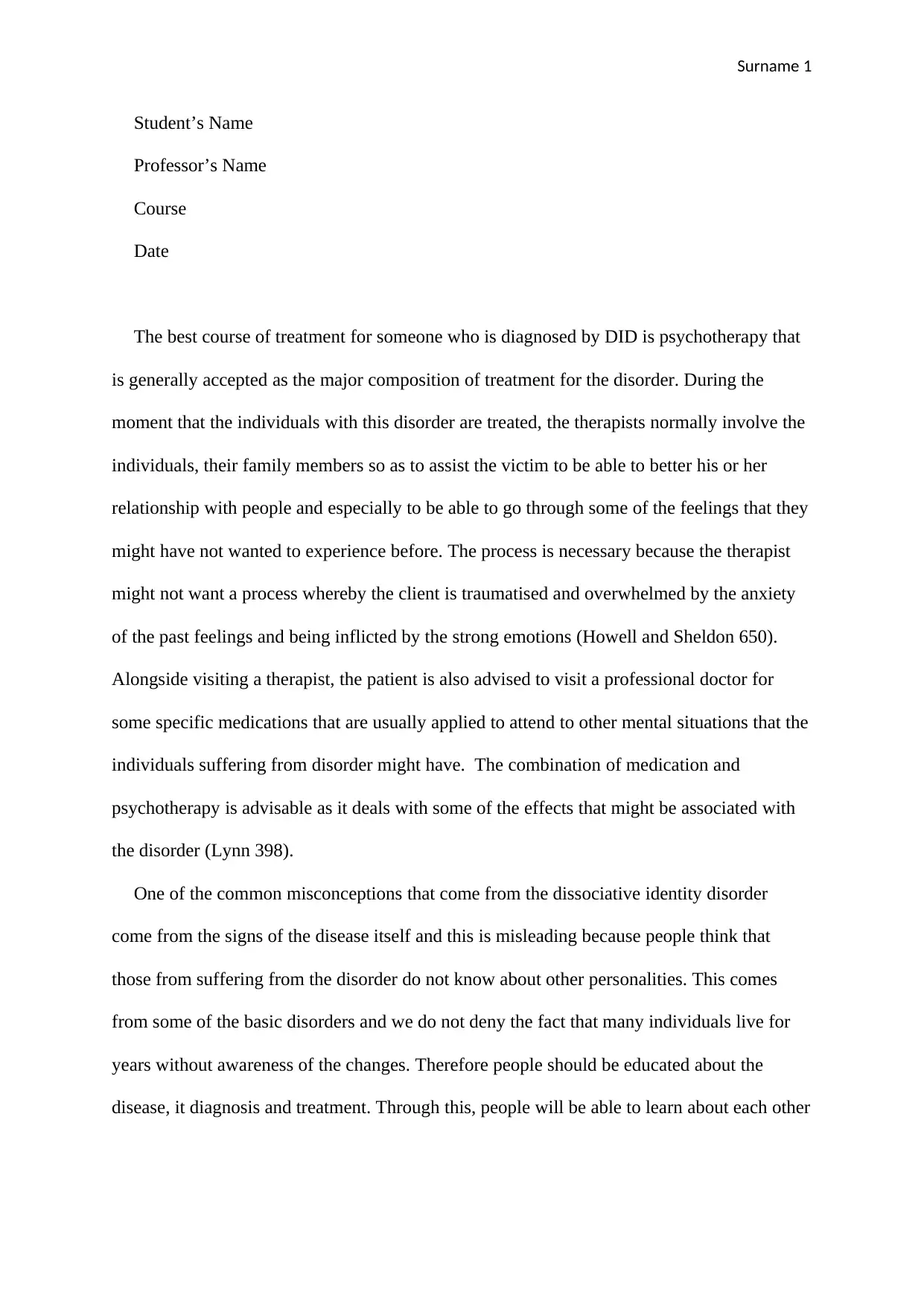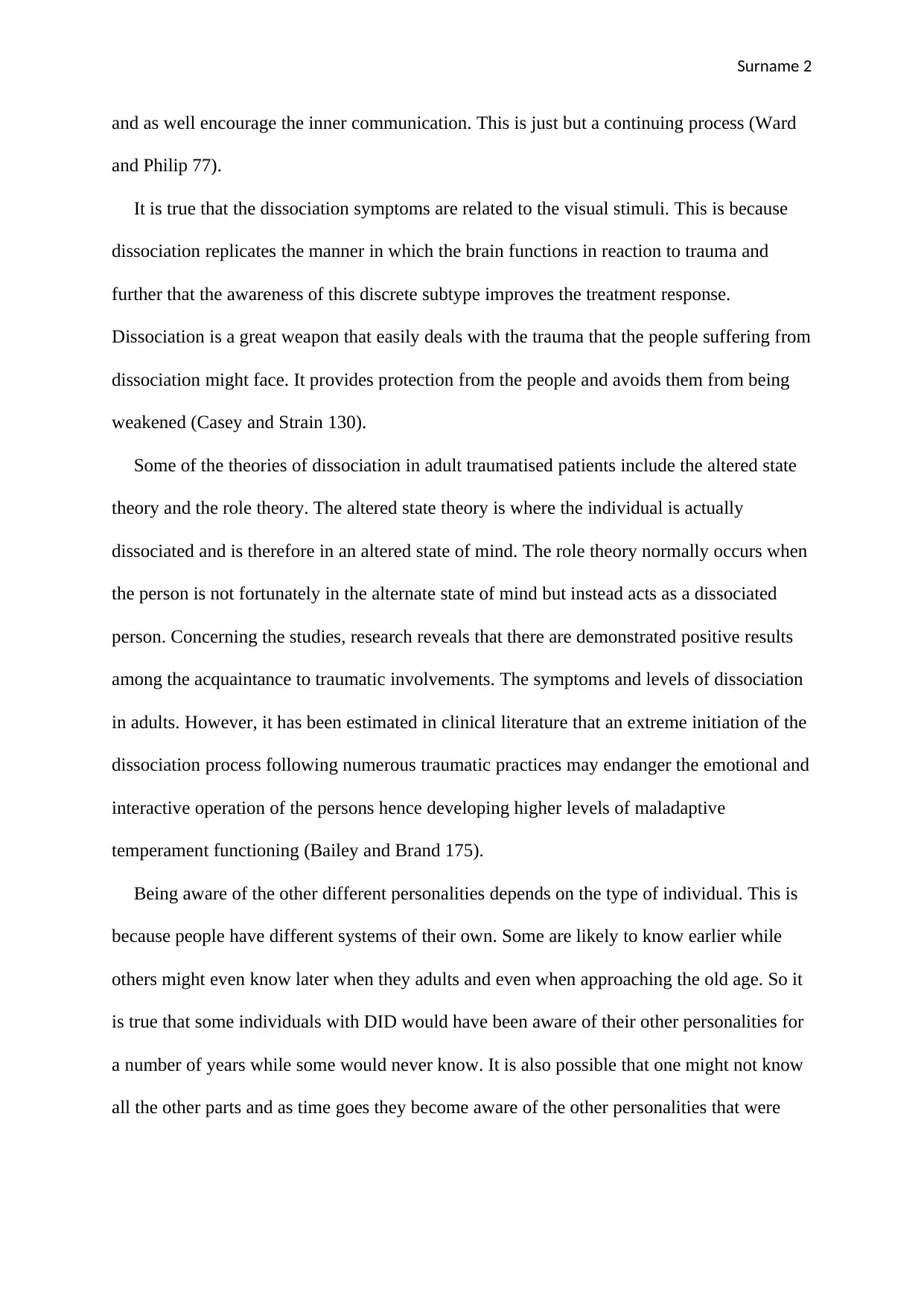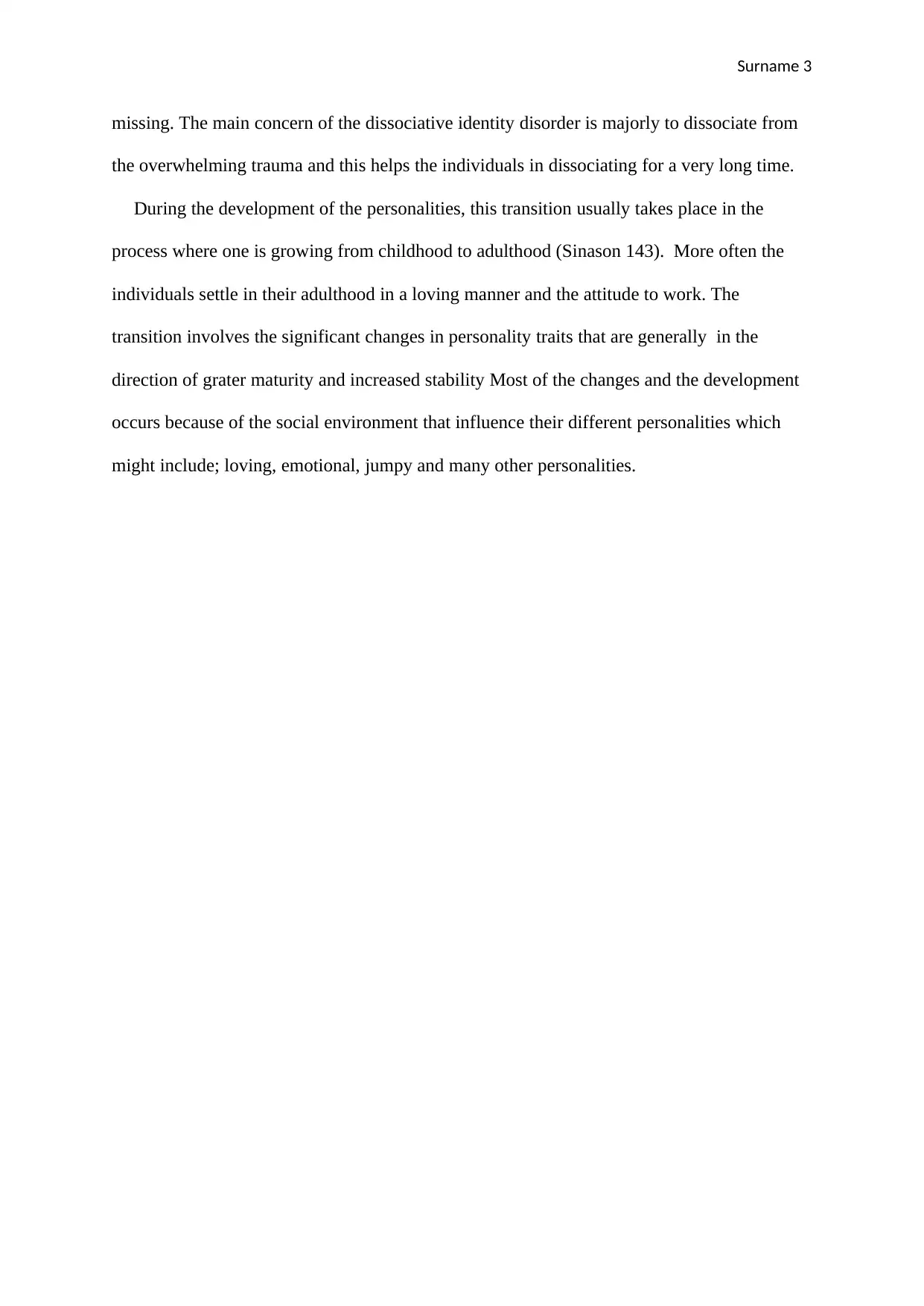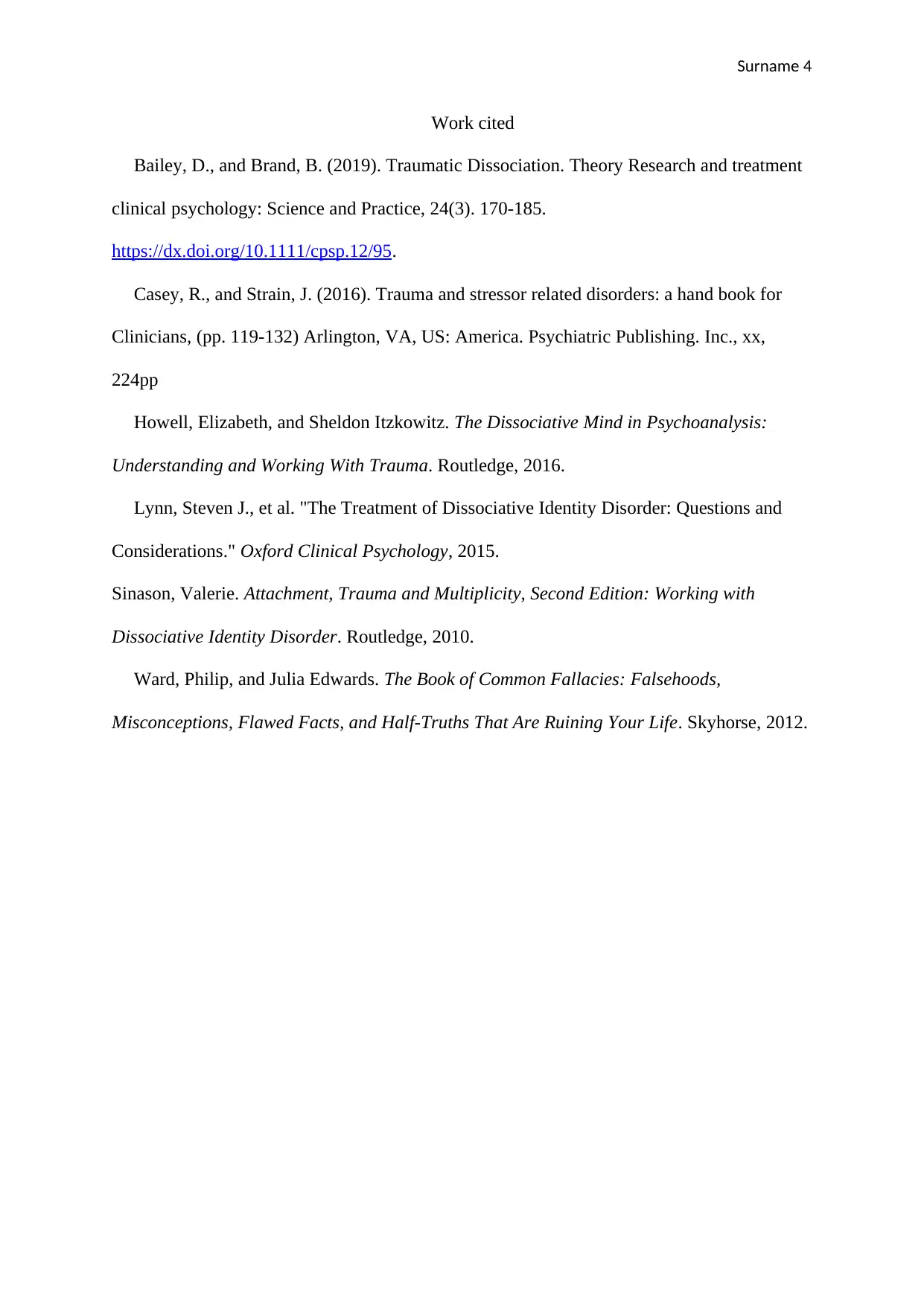Treatment Approaches for Dissociative Identity Disorder
VerifiedAdded on 2023/03/31
|4
|850
|62
Essay
AI Summary
This essay examines the primary treatment approaches for Dissociative Identity Disorder (DID), emphasizing the importance of psychotherapy as a cornerstone of care. It highlights the involvement of family members in therapy to improve relationships and address past traumas. The essay also advocates for the combined use of medication to manage associated mental health conditions. It then addresses common misconceptions about DID, such as the awareness of other personalities, and stresses the need for education about the disorder. The essay also discusses the role of dissociation in coping with trauma, the altered state and role theories, and research findings on the effects of traumatic experiences. It concludes by mentioning that the development of different personalities depends on the individual, and the transition often occurs from childhood to adulthood.

Surname 1
Student’s Name
Professor’s Name
Course
Date
The best course of treatment for someone who is diagnosed by DID is psychotherapy that
is generally accepted as the major composition of treatment for the disorder. During the
moment that the individuals with this disorder are treated, the therapists normally involve the
individuals, their family members so as to assist the victim to be able to better his or her
relationship with people and especially to be able to go through some of the feelings that they
might have not wanted to experience before. The process is necessary because the therapist
might not want a process whereby the client is traumatised and overwhelmed by the anxiety
of the past feelings and being inflicted by the strong emotions (Howell and Sheldon 650).
Alongside visiting a therapist, the patient is also advised to visit a professional doctor for
some specific medications that are usually applied to attend to other mental situations that the
individuals suffering from disorder might have. The combination of medication and
psychotherapy is advisable as it deals with some of the effects that might be associated with
the disorder (Lynn 398).
One of the common misconceptions that come from the dissociative identity disorder
come from the signs of the disease itself and this is misleading because people think that
those from suffering from the disorder do not know about other personalities. This comes
from some of the basic disorders and we do not deny the fact that many individuals live for
years without awareness of the changes. Therefore people should be educated about the
disease, it diagnosis and treatment. Through this, people will be able to learn about each other
Student’s Name
Professor’s Name
Course
Date
The best course of treatment for someone who is diagnosed by DID is psychotherapy that
is generally accepted as the major composition of treatment for the disorder. During the
moment that the individuals with this disorder are treated, the therapists normally involve the
individuals, their family members so as to assist the victim to be able to better his or her
relationship with people and especially to be able to go through some of the feelings that they
might have not wanted to experience before. The process is necessary because the therapist
might not want a process whereby the client is traumatised and overwhelmed by the anxiety
of the past feelings and being inflicted by the strong emotions (Howell and Sheldon 650).
Alongside visiting a therapist, the patient is also advised to visit a professional doctor for
some specific medications that are usually applied to attend to other mental situations that the
individuals suffering from disorder might have. The combination of medication and
psychotherapy is advisable as it deals with some of the effects that might be associated with
the disorder (Lynn 398).
One of the common misconceptions that come from the dissociative identity disorder
come from the signs of the disease itself and this is misleading because people think that
those from suffering from the disorder do not know about other personalities. This comes
from some of the basic disorders and we do not deny the fact that many individuals live for
years without awareness of the changes. Therefore people should be educated about the
disease, it diagnosis and treatment. Through this, people will be able to learn about each other
Paraphrase This Document
Need a fresh take? Get an instant paraphrase of this document with our AI Paraphraser

Surname 2
and as well encourage the inner communication. This is just but a continuing process (Ward
and Philip 77).
It is true that the dissociation symptoms are related to the visual stimuli. This is because
dissociation replicates the manner in which the brain functions in reaction to trauma and
further that the awareness of this discrete subtype improves the treatment response.
Dissociation is a great weapon that easily deals with the trauma that the people suffering from
dissociation might face. It provides protection from the people and avoids them from being
weakened (Casey and Strain 130).
Some of the theories of dissociation in adult traumatised patients include the altered state
theory and the role theory. The altered state theory is where the individual is actually
dissociated and is therefore in an altered state of mind. The role theory normally occurs when
the person is not fortunately in the alternate state of mind but instead acts as a dissociated
person. Concerning the studies, research reveals that there are demonstrated positive results
among the acquaintance to traumatic involvements. The symptoms and levels of dissociation
in adults. However, it has been estimated in clinical literature that an extreme initiation of the
dissociation process following numerous traumatic practices may endanger the emotional and
interactive operation of the persons hence developing higher levels of maladaptive
temperament functioning (Bailey and Brand 175).
Being aware of the other different personalities depends on the type of individual. This is
because people have different systems of their own. Some are likely to know earlier while
others might even know later when they adults and even when approaching the old age. So it
is true that some individuals with DID would have been aware of their other personalities for
a number of years while some would never know. It is also possible that one might not know
all the other parts and as time goes they become aware of the other personalities that were
and as well encourage the inner communication. This is just but a continuing process (Ward
and Philip 77).
It is true that the dissociation symptoms are related to the visual stimuli. This is because
dissociation replicates the manner in which the brain functions in reaction to trauma and
further that the awareness of this discrete subtype improves the treatment response.
Dissociation is a great weapon that easily deals with the trauma that the people suffering from
dissociation might face. It provides protection from the people and avoids them from being
weakened (Casey and Strain 130).
Some of the theories of dissociation in adult traumatised patients include the altered state
theory and the role theory. The altered state theory is where the individual is actually
dissociated and is therefore in an altered state of mind. The role theory normally occurs when
the person is not fortunately in the alternate state of mind but instead acts as a dissociated
person. Concerning the studies, research reveals that there are demonstrated positive results
among the acquaintance to traumatic involvements. The symptoms and levels of dissociation
in adults. However, it has been estimated in clinical literature that an extreme initiation of the
dissociation process following numerous traumatic practices may endanger the emotional and
interactive operation of the persons hence developing higher levels of maladaptive
temperament functioning (Bailey and Brand 175).
Being aware of the other different personalities depends on the type of individual. This is
because people have different systems of their own. Some are likely to know earlier while
others might even know later when they adults and even when approaching the old age. So it
is true that some individuals with DID would have been aware of their other personalities for
a number of years while some would never know. It is also possible that one might not know
all the other parts and as time goes they become aware of the other personalities that were

Surname 3
missing. The main concern of the dissociative identity disorder is majorly to dissociate from
the overwhelming trauma and this helps the individuals in dissociating for a very long time.
During the development of the personalities, this transition usually takes place in the
process where one is growing from childhood to adulthood (Sinason 143). More often the
individuals settle in their adulthood in a loving manner and the attitude to work. The
transition involves the significant changes in personality traits that are generally in the
direction of grater maturity and increased stability Most of the changes and the development
occurs because of the social environment that influence their different personalities which
might include; loving, emotional, jumpy and many other personalities.
missing. The main concern of the dissociative identity disorder is majorly to dissociate from
the overwhelming trauma and this helps the individuals in dissociating for a very long time.
During the development of the personalities, this transition usually takes place in the
process where one is growing from childhood to adulthood (Sinason 143). More often the
individuals settle in their adulthood in a loving manner and the attitude to work. The
transition involves the significant changes in personality traits that are generally in the
direction of grater maturity and increased stability Most of the changes and the development
occurs because of the social environment that influence their different personalities which
might include; loving, emotional, jumpy and many other personalities.
⊘ This is a preview!⊘
Do you want full access?
Subscribe today to unlock all pages.

Trusted by 1+ million students worldwide

Surname 4
Work cited
Bailey, D., and Brand, B. (2019). Traumatic Dissociation. Theory Research and treatment
clinical psychology: Science and Practice, 24(3). 170-185.
https://dx.doi.org/10.1111/cpsp.12/95.
Casey, R., and Strain, J. (2016). Trauma and stressor related disorders: a hand book for
Clinicians, (pp. 119-132) Arlington, VA, US: America. Psychiatric Publishing. Inc., xx,
224pp
Howell, Elizabeth, and Sheldon Itzkowitz. The Dissociative Mind in Psychoanalysis:
Understanding and Working With Trauma. Routledge, 2016.
Lynn, Steven J., et al. "The Treatment of Dissociative Identity Disorder: Questions and
Considerations." Oxford Clinical Psychology, 2015.
Sinason, Valerie. Attachment, Trauma and Multiplicity, Second Edition: Working with
Dissociative Identity Disorder. Routledge, 2010.
Ward, Philip, and Julia Edwards. The Book of Common Fallacies: Falsehoods,
Misconceptions, Flawed Facts, and Half-Truths That Are Ruining Your Life. Skyhorse, 2012.
Work cited
Bailey, D., and Brand, B. (2019). Traumatic Dissociation. Theory Research and treatment
clinical psychology: Science and Practice, 24(3). 170-185.
https://dx.doi.org/10.1111/cpsp.12/95.
Casey, R., and Strain, J. (2016). Trauma and stressor related disorders: a hand book for
Clinicians, (pp. 119-132) Arlington, VA, US: America. Psychiatric Publishing. Inc., xx,
224pp
Howell, Elizabeth, and Sheldon Itzkowitz. The Dissociative Mind in Psychoanalysis:
Understanding and Working With Trauma. Routledge, 2016.
Lynn, Steven J., et al. "The Treatment of Dissociative Identity Disorder: Questions and
Considerations." Oxford Clinical Psychology, 2015.
Sinason, Valerie. Attachment, Trauma and Multiplicity, Second Edition: Working with
Dissociative Identity Disorder. Routledge, 2010.
Ward, Philip, and Julia Edwards. The Book of Common Fallacies: Falsehoods,
Misconceptions, Flawed Facts, and Half-Truths That Are Ruining Your Life. Skyhorse, 2012.
1 out of 4
Related Documents
Your All-in-One AI-Powered Toolkit for Academic Success.
+13062052269
info@desklib.com
Available 24*7 on WhatsApp / Email
![[object Object]](/_next/static/media/star-bottom.7253800d.svg)
Unlock your academic potential
Copyright © 2020–2026 A2Z Services. All Rights Reserved. Developed and managed by ZUCOL.




